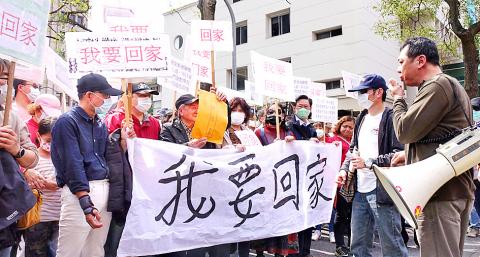Former president Ma Ying-jeou (馬英九) yesterday called on President Tsai Ing-wen’s (蔡英文) administration not to let populism and discrimination dictate its governance, following a government decision on Wednesday not to allow Chinese children of Taiwanese and Chinese couples to enter Taiwan, reversing a measure announced a day earlier by the Mainland Affairs Council (MAC).
The ban contravenes the spirit of the UN’s Convention on the Rights of the Child, Ma said, adding that existing regulations impose more stringent requirements on such children to acquire Republic of China (ROC) nationality compared with people from other countries.
“It is not that they did not choose Taiwan; it is that even if they had chosen, they must wait a long time,” Ma said.

Photo: Fang Pin-chao, Taipei Times
The council’s initial announcement was correct and humane, he said.
“We cannot just let children who have lived in Taiwan for so many years roam the streets,” he added.
While people should support the government’s disease-prevention efforts, Ma said he believes that under a consistent and thorough system, it is possible to adopt a more humane approach that takes the rights of others into consideration.
“President Tsai once said that ‘migrant spouses and workers are all a part of Taiwan.’ As such, these ‘children of Taiwan,’ even without their parents at their side, should be considered our fellow citizens,” Ma said.
“Let them come home and be united with their families, President Tsai. Do not let populism trample on human rights and discrimination trump humanity,” Ma added.
Separately, former New Taipei City mayor Eric Chu (朱立倫) said on Facebook that the “citizens first” mindset should not include separating families.
“Our customs policy should not pander to populist sentiments and promote discrimination,” he said.
In response, Premier Su Tseng-chang (蘇貞昌) said that to save others, one must save oneself first.
There must not be any breaches in disease-prevention efforts, because “everyone would die if the ship sinks, which would defeat the purpose of saving others,” Su said. “And so we must act within our power.”
The policy reversal came on the heels of a firestorm of criticism on social media over the MAC’s announcement.
MAC Minister Chen Ming-tong (陳明通) said that the announcement was not designed to open Taiwan’s borders to relatives of Chinese spouses in contravention of a temporary ban on the entry of Chinese nationals to prevent the spread of COVID-19, which originated in Wuhan, China.
Later that day, at a news briefing held by the Central Epidemic Command Center (CECC), Chen added new stipulations, saying that only minor Chinese children who do not have relatives to look after them in China would be allowed to enter Taiwan.
Hours later, with public anger still running high, the MAC listed a third condition, saying only if both a child’s parents are currently in Taiwan would the child be allowed entry.
The news triggered another round of heated discussion on social media, prompting Minister of Health and Welfare Minister Chen Shih-chung (陳時中), who heads the CECC, on Wednesday to announce a policy U-turn.
Chinese children of Taiwanese and Chinese couples who hold residence or visitor permits, but not ROC passports, would not be allowed into the country, he said.
While such children have equal rights to healthcare in Taiwan, priority must be given to ROC citizens in the face of a fast-spreading epidemic, he said.
“They must shoulder the consequences of not choosing to apply for Taiwanese citizenship for their children,” Chen said.
Additional reporting by Sean Lin

Taiwanese can file complaints with the Tourism Administration to report travel agencies if their activities caused termination of a person’s citizenship, Mainland Affairs Council Minister Chiu Chui-cheng (邱垂正) said yesterday, after a podcaster highlighted a case in which a person’s citizenship was canceled for receiving a single-use Chinese passport to enter Russia. The council is aware of incidents in which people who signed up through Chinese travel agencies for tours of Russia were told they could obtain Russian visas and fast-track border clearance, Chiu told reporters on the sidelines of an event in Taipei. However, the travel agencies actually applied

Japanese footwear brand Onitsuka Tiger today issued a public apology and said it has suspended an employee amid allegations that the staff member discriminated against a Vietnamese customer at its Taipei 101 store. Posting on the social media platform Threads yesterday, a user said that an employee at the store said that “those shoes are very expensive” when her friend, who is a migrant worker from Vietnam, asked for assistance. The employee then ignored her until she asked again, to which she replied: "We don't have a size 37." The post had amassed nearly 26,000 likes and 916 comments as of this

New measures aimed at making Taiwan more attractive to foreign professionals came into effect this month, the National Development Council said yesterday. Among the changes, international students at Taiwanese universities would be able to work in Taiwan without a work permit in the two years after they graduate, explainer materials provided by the council said. In addition, foreign nationals who graduated from one of the world’s top 200 universities within the past five years can also apply for a two-year open work permit. Previously, those graduates would have needed to apply for a work permit using point-based criteria or have a Taiwanese company

The Shilin District Prosecutors’ Office yesterday indicted two Taiwanese and issued a wanted notice for Pete Liu (劉作虎), founder of Shenzhen-based smartphone manufacturer OnePlus Technology Co (萬普拉斯科技), for allegedly contravening the Act Governing Relations Between the People of the Taiwan Area and the Mainland Area (臺灣地區與大陸地區人民關係條例) by poaching 70 engineers in Taiwan. Liu allegedly traveled to Taiwan at the end of 2014 and met with a Taiwanese man surnamed Lin (林) to discuss establishing a mobile software research and development (R&D) team in Taiwan, prosecutors said. Without approval from the government, Lin, following Liu’s instructions, recruited more than 70 software